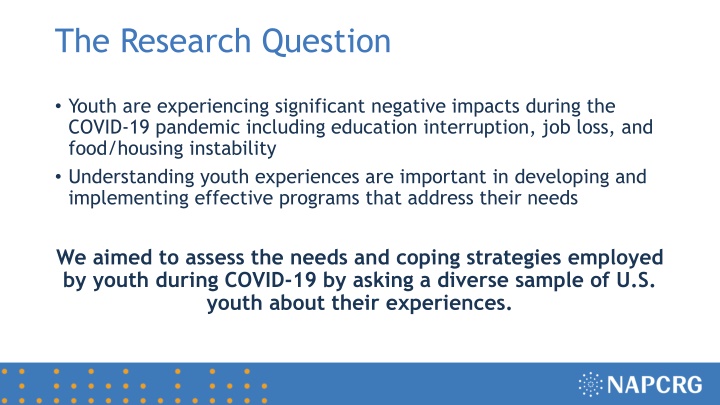
Youth Experiences and Coping Strategies During COVID-19
This research explores the impacts of the COVID-19 pandemic on U.S. youth, highlighting their needs and coping strategies. Findings show diverse needs, struggles in obtaining resources, and various coping mechanisms employed. Recommendations for clinical practice include addressing day-to-day essentials, providing emotional support, and encouraging social connections for youth well-being.
Download Presentation

Please find below an Image/Link to download the presentation.
The content on the website is provided AS IS for your information and personal use only. It may not be sold, licensed, or shared on other websites without obtaining consent from the author. If you encounter any issues during the download, it is possible that the publisher has removed the file from their server.
You are allowed to download the files provided on this website for personal or commercial use, subject to the condition that they are used lawfully. All files are the property of their respective owners.
The content on the website is provided AS IS for your information and personal use only. It may not be sold, licensed, or shared on other websites without obtaining consent from the author.
E N D
Presentation Transcript
The Research Question Youth are experiencing significant negative impacts during the COVID-19 pandemic including education interruption, job loss, and food/housing instability Understanding youth experiences are important in developing and implementing effective programs that address their needs We aimed to assess the needs and coping strategies employed by youth during COVID-19 by asking a diverse sample of U.S. youth about their experiences.
Research Design and Method Participants: MyVoice national cohort of youth Age 14-24 from across the United States recruited via social media Questions posed on March 20, 2020 via text message 1. What resources do you need right now? Are you able to get them? 2. How have you been dealing with the impact of the coronavirus pandemic on your life? Codebook developed using thematic analysis for open-ended text message responses by 2 independent coders Descriptive statistics calculated for demographic data and code frequencies
Findings Data collected from 950 participants (90.9% response rate) Youth face diverse needs and some are unable to obtain necessary resources Approximately 1/3rdreported unavailable resources including food or water, household supplies, cleaning supplies, and money or work Many are experiencing negative emotions including depression, anxiety, and anger, with fewer mentioning indifference or feeling positive Youth reported a wide range of coping strategies to handle stressors including practicing prevention strategies, staying connected, staying positive, distraction, and doing school work
What this means for Clinical Practice Continued outreach efforts should specifically consider youth needs including: Day-to-day essentials Internet access for safe socialization, education, and work Emotional support and care Healthcare providers can support youth by: Asking about essential needs and sharing relevant resources Assessing mental health status Discussing safe coping strategies and efforts Encouraging engagement in school, work, and social connection
